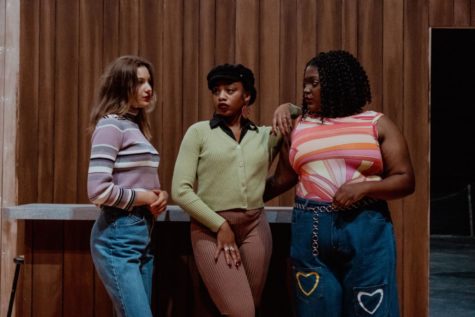‘This is history’: “Detroit ‘67” tells a story created for – and by – Black voices
Baldwin Wallace’s production of Domique Morisseau’s 2013 play, opening Oct. 5, is making history for the Department of Theatre & Dance.
History meets the present as Baldwin Wallace students stage “Detroit ‘67,” the first BW production of a play written by a Black female playwright featuring a cast and crew comprised of a majority of people of color, at the Mainstage Theatre in Kleist Center for Art & Drama from Oct. 5-9.
Written by Dominique Morisseau, “Detroit ‘67” brings audiences into the basement-turned-unlicensed after-hour joint run by siblings Chelle and Lank amid the 1967 Detroit race riots, as tensions rise when Lank provides a safe haven for a white woman.
“It’s about the struggle of the Black family and how no matter what we go through, we continue to push forward, and we continue to find ways to make things happen for us,” said Junior Nelia Holley, who plays Bonita Bunny.
“Detroit ‘67” is directed by guest director and BW alum Nathan Henry, recipient of the 2018 Cleveland Scene Theatre Award for best director.
Student director Laila Tyler said that working on this show with Henry has been special to her because they both hold high regard for Morisseau’s work, calling the playwright “an excellent storyteller and an excellent bullhorn of Black voices.”
“To be able to do a show that is written by a woman of color that has such strong characters in it [is] a really refreshing experience because I haven’t gotten to work with a lot of material that is meant for people like me,” Tyler said.
The intimate “Detroit ‘67” is the first play written by a Black woman produced within the Department of Theatre & Dance, Holley said. It is a production created specifically to highlight Black stories and Black actors.
“This is history,” Holley said. “Knowing that this show could make a difference, it just brings so much warmth and joy to my heart because I feel like you don’t always get these kinds of experiences.”
BW students in the cast and production team received open communication in the rehearsal space created by Henry, both in allowing the students to explore their characters as well as talking through the sensitive subject material.
Kyra Conkright, the production stage manager, said that being Puerto Rican herself, she wanted to be part of a production which highlights a “majority minority” cast.
“It’s such an important story, and I’ve heard from [the cast] countless times how happy they are to finally put on a Black playwright’s play,” Conkright said. “Being in this safe space with them is just really nice, and we get to talk to each other about our experiences.”

In 2020, America saw a resurgence of the Black Lives Matter movement in response to high-profile incidents of racism and police brutality targeted towards Black individuals, and Tyler said that these events forced many Black artists to rethink how they and their stories have been portrayed on stage.
“A lot of us in theater really had to sit with ourselves and think about the stories we were telling,” Tyler said. “Now, it feels like the theater world is giving us a lot more choice and a lot more opportunity to tell different stories from different people.”
“Detroit ‘67” sheds light on a Black experience that most students at Baldwin Wallace have never and will never experience and gives Black students the opportunity to share their stories and talents with the audience, Holley said.
“I think that the people of color here should … be able to show their talent and their abilities just as much and on grand of a scale as everyone, and I think this is the start of that,” Holley said.
In a world where racism, sexism and protests against these injustices persist, “Detroit ‘67” challenges its audience to think about what they are doing to support those who are targeted by these acts of aggression.
“If you didn’t know that this was called ‘Detroit ‘67’, it could be called ‘Detroit ‘22’ and still be relevant to today’s events,” Conkright said.
Conkright said that she encourages those in the BW community to see the show because they will connect with their peers and learn the struggles of the Black experience.
Tyler said: “I want [the audience] to walk away understanding, ‘there are people that I don’t necessarily relate to, but I can sympathize with them, and I can empathize with them, and I can think outside of myself.’”
Admission to “Detroit ‘67” is free for students. More information including ticket sales can be found at https://www.bw.edu/events/theatre-dance.
The Exponent is looking for financial contributions to support our staff and our newsroom in producing high-quality, well-reported and accurate journalism. Thank you for taking the time to consider supporting our student journalists.





























